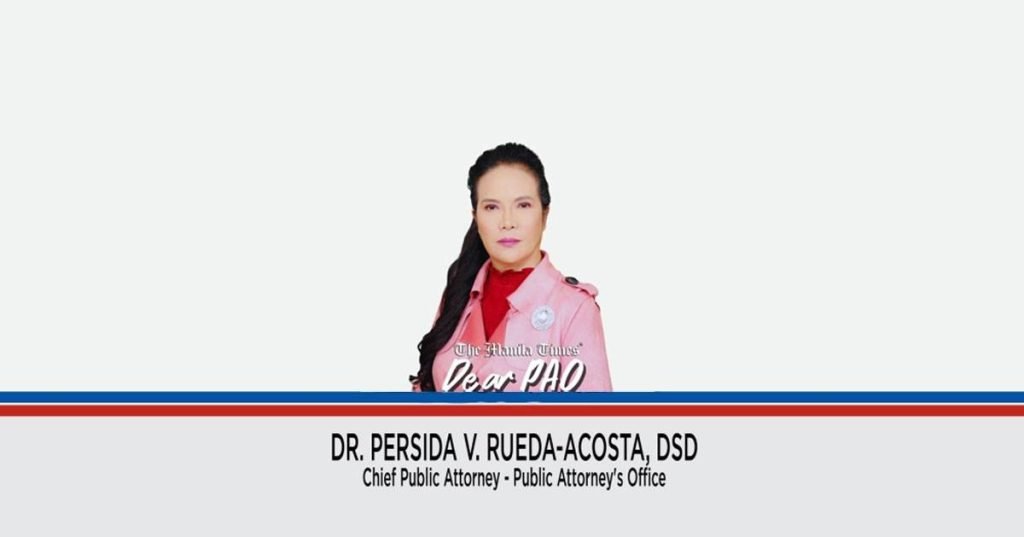
Dear PAO,
X and Y had a long-standing animosity. Their neighbors knew about it; X and Y were seen engaging in fistfights on several occasions. A couple of months ago, an altercation between them led to X stabbing Y multiple times, resulting in Y’s eventual death. X fled from the scene and has not been seen since then. A complaint was filed against X and a warrant of arrest was issued, with a manhunt organized by our local police. Recently, Z, the brother of X, surrendered X to the police to prevent X from getting hurt due to the manhunt. From what the family of Y has heard, X will be invoking his surrender as a mitigating circumstance. Is this possible?
Rommel
Dear Rommel,
There are certain circumstances recognized under our law which, if clearly proven, have the effect of lessening the penalty to be imposed upon an accused. These are called mitigating circumstances, one of which is voluntary surrender. To be certain, Article 13 of the Revised Penal Code states:
“Article 13. Mitigating circumstances. – The following are mitigating circumstances:
“1. Those mentioned in the preceding chapter, when all the requisites necessary to justify or to exempt from criminal liability in the respective cases are not attendant.
“2. That the offender is under eighteen years of age or over seventy years. In the case of the minor, he shall be proceeded against in accordance with the provisions of Art. 80.
“3. That the offender had no intention to commit so grave a wrong as that committed.
“4. That sufficient provocation or threat on the part of the offended party immediately preceded the act.
“5. That the act was committed in the immediate vindication of a grave offense to the one committing the felony (delito), his spouse, ascendants, or relatives by affinity within the same degrees.
“6. That of having acted upon an impulse so powerful as naturally to have produced passion or obfuscation.
“7. That the offender had voluntarily surrendered himself to a person in authority or his agents, or that he had voluntarily confessed his guilt before the court prior to the presentation of the evidence for the prosecution;
“8. That the offender is deaf and dumb, blind or otherwise suffering some physical defect which thus restricts his means of action, defense, or communications with his fellow beings.
“9. Such illness of the offender as would diminish the exercise of the willpower of the offender without, however, depriving him of the consciousness of his acts.
“10. And, finally, any other circumstances of a similar nature and analogous to those above mentioned.” (Emphasis supplied)
It bears emphasis that voluntary surrender must have a badge of remorse. Thus, for voluntary surrender to be considered in mitigating the penalty to be imposed upon an accused, the following requisites must be established: (1) That the offender has not yet been arrested; (2) That the offender himself/herself surrendered to the authorities; and (3) That the surrender was done voluntarily. Absent any of the mentioned requisites will not result in the appreciation of the accused’s surrender. Our Supreme Court, through Associate Justice Consuelo Ynares-Santiago, explained in the case of Joel Luces v. People of the Philippines (GR 149492, January 20, 2003):
“x x x To benefit an accused, the following requisites must be proven, namely: (1) the offender has not actually been arrested; (2) the offender surrendered himself to a person in authority; and (3) the surrender was voluntary. A surrender to be voluntary must be spontaneous, showing the intent of the accused to submit himself unconditionally to the authorities, either because he acknowledges his guilt, or he wishes to save them the trouble and expense necessarily incurred in his search and capture. Voluntary surrender presupposes repentance. In People v. Viernes, we held that going to the police station to clear one’s name does not show any intent to surrender unconditionally to the authorities.
“In the case at bar, petitioner surrendered to the authorities in order to disclaim responsibility for the killing of the victim. This hardly shows any repentance or acknowledgment of the crime on the part of the petitioner. Moreover, at the time petitioner surrendered, there was already a pending warrant of arrest against him. His arrest by that time was imminent. Hence, he should not be credited with the mitigating circumstance of voluntary surrender.” (Emphasis supplied)
In the situation you shared, we believe that X’s surrender may not be appreciated in his favor because there appears to be no voluntariness on his part. For one, he did not surrender himself but it was his brother who turned him over to the authorities after a complaint was already filed and a warrant was issued against him. Also, X merely surrendered, allegedly, in order to avoid getting into a more complicated situation because of the ongoing manhunt against him. Absent such a requirement, the mitigating circumstance of voluntary surrender may not be appreciated.
We hope that we were able to answer your queries. This advice is based solely on the facts you have narrated and our appreciation of the same. Our opinion may vary when other facts are changed or elaborated.
Editor’s note: Dear PAO is a daily column of the Public Attorney’s Office. Questions for Chief Acosta may be sent to [email protected].







